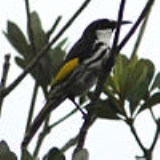
White-cheeked Honeyeater
Encyclopedia
The White-cheeked Honeyeater (Phylidonyris nigra) inhabits the east coast and the south-west corner of Australia
. It has a large white patch on its cheek, a brown eye, and a yellow panel on its wing.
Minimum size: 16 cm
Maximum size: 19 cm
Average size: 18 cm
Average weight: 19.5 g
, Phylidonyris novaehollandiae, is very similar in size, shape and appearance, but can be distinguished by its white eye. Other black and white honeyeaters are much smaller, including the Crescent (P. pyrrhoptera), Tawny-crowned (P. melanops) and White-fronted Honeyeaters (P. albifrons). Although very similar In appearance, there is not much competition between White-cheeked and New Holland Honeyeaters, as they choose different perching sites and have different nesting seasons.
Breeding season: All months, usually coincides with nectar availability
Clutch size: 1 to 3, usually 2
Incubation: 15 days
Time in nest: 15 days
Australia
Australia , officially the Commonwealth of Australia, is a country in the Southern Hemisphere comprising the mainland of the Australian continent, the island of Tasmania, and numerous smaller islands in the Indian and Pacific Oceans. It is the world's sixth-largest country by total area...
. It has a large white patch on its cheek, a brown eye, and a yellow panel on its wing.
Description
The White-cheeked Honeyeater is a medium-sized black and white honeyeater, with a long, sturdy bill that curves downwards. It has large bright yellow tail and wing panels, with a large conspicuous white cheek patch on a mainly black head. The eye is dark brown. Young birds are duller (brownish) and paler with softer, fluffier plumage. Gregarious, active and noisy with swift, erratic flight.Minimum size: 16 cm
Maximum size: 19 cm
Average size: 18 cm
Average weight: 19.5 g
Similar species
The New Holland HoneyeaterNew Holland Honeyeater
The New Holland Honeyeater is a honeyeater species found throughout southern Australia. It was among the first birds to be scientifically described in Australia, and was initially named Certhia novaehollandiae...
, Phylidonyris novaehollandiae, is very similar in size, shape and appearance, but can be distinguished by its white eye. Other black and white honeyeaters are much smaller, including the Crescent (P. pyrrhoptera), Tawny-crowned (P. melanops) and White-fronted Honeyeaters (P. albifrons). Although very similar In appearance, there is not much competition between White-cheeked and New Holland Honeyeaters, as they choose different perching sites and have different nesting seasons.
Distribution
The White-cheeked Honeyeater is endemic to eastern and south-western Australia, ranging from east of the Great Divide in Queensland through coastal New South Wales, becoming scattered south to Jervis Bay. Also in south-western Western Australia and from Perth northwards to Murchison River.Habitat
The White-cheeked Honeyeater is usually found in moist heath lands, as well as around wetlands and in forests or woodlands with a heath under storey. Found in both temperate and subtropical zones. Found in parks, gardens and flowering street trees throughout range. Not afraid of humans and adapting easily to settlement activity, they are sometimes killed by cats.Seasonal movements
Mostly resident or sedentary, with some seasonal movement at edge of range.Feeding
White-cheeked Honeyeaters feed mainly at flowers, in foliage, on bark or in the air and mainly eat nectar, but also insects. They often feed in small groups and may feed beside New Holland Honeyeater groups.Breeding
White-cheeked Honeyeaters pair monogamously for the breeding season, with males defending breeding territories that can be held for several years. Males aggressively attack other birds of their own and other species during the breeding season, but not familiar birds such as their own mates, relatives and resident neighbours. There is not much competition between White-cheeked and New Holland Honeyeaters, as they choose different perching sites and have different nesting seasons. The female builds a cup-shaped nest from twigs, bark, and other plant materials, lined with pieces of flowers (e.g. Banksias, Isopogons). The nest is placed low in forked branches of trees or shrubs, often close to the ground, but well-concealed in dense foliage or in grass below shrubs and ferns. Both parents feed young.Breeding season: All months, usually coincides with nectar availability
Clutch size: 1 to 3, usually 2
Incubation: 15 days
Time in nest: 15 days

